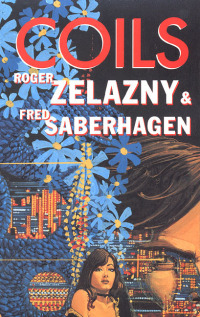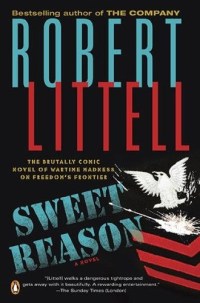Coils by Roger Zelazny and Fred Saberhagen
 Sunday, January 2, 2011 at 11:41PM
Sunday, January 2, 2011 at 11:41PM 
First published in 1982
The beginning of this 1982 novel seems familiar. Donald lives a carefree life. Money is transferred into his account every month. When he tries to remember why, he gets a headache, so he stops trying. Taking his girlfriend to see his childhood home, he discovers that the town in which he grew up isn't there ... or at least it isn't the town he remembers. When he sees a shrink to get help, the doctor dies. Then his girlfriend disappears. But thanks to the one session of hypnosis he experienced before the doctor's death, he starts to remember things ....
Missing memories, implanted memories, new life, flashbacks to a forgotten life ... it all sounds like a Ludlum novel. Yet Zelazny and Saberhagen give the story a unique twist. Donald BelPatri has the ability to interface with computers, mind to machine; thus the story gains its science-fictional aspect. This, too, seems like a familiar story, but remember that the novel was published in 1982, two years before William Gibson's "ground-breaking" Neuromancer. The notion of mind-computer interfacing was still fresh when Coils was written (in Coils, the interface is telepathic, as opposed to the wired interface contemplated by other writers, although Zelazny and Saberhagen provide a halfway plausible explanation for that ability toward the novel's end). The ability to move mentally within circuitry is an integral part of the novel, and it works well, providing an interesting framework for a novel that would otherwise be fairly ordinary.
Coils is one of the better examples of the marriage of a science fiction story to a thriller. The pace is relentless, the action scenes are vivid, yet the relationship between man and machine elevates the novel to a level of intellectual intrigue that many mainstream thrillers can't manage. The main characters are well conceived, although some of the minor characters (like a televangelist who happens to have telekinetic powers) are a bit stereotypical (well, except for the telekinetic powers). And while it was more fashionable to make an evil corporation the villain in 1982 than it is today (after Enron, Halliburton, and their ilk, the reality of the evil corporation has supplanted fiction), it makes for an engaging plot device. The storytelling is smart but straightforward, making Coils an easy, entertaining read.
RECOMMENDED



